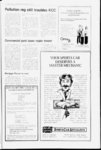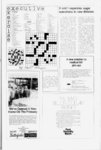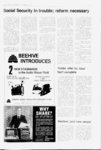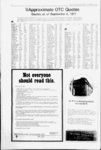| OCR Text |
Show THE NATIONAL ENTERPRISE, SEPTEMBER 7, 1977 27 by Parker Nielson President Carter will sign the Panama Canal treaty this week. Once signed, he must consider how he will deal with his breast beating critics, for the treaty has unfortunately become a rallying point for those on the right. The doddering old warriors of the American Legion, Ronald Reagan, and Utah's own Sen. Orrin Hatch have variously proclaimed the canal treaty a threat to our national security, a defeat to our national image, a surrender of our sovereignty or a sellout to communism. It is doubtful it is any of these. Ratification of the treaty could hardly be considered a defeat to the United States or a threat to our national pride. No rational mind, in this country or elsewhere, could believe that an international midget like the Republic of Panama had actually forced the mighty U.S. to accept this or any other treaty. Neither is the issue national security or sovereignty. We have never claimed sovereignty over the canal and many of the vessels that are important to our security, such as aircraft carriers and super tankers, cannot use it in any event. Other military and commercial craft do, but if the canal were ever closed to them, in violation of the treaty or in a way which posed a real threat to our security, we could as easily take possession of the canal - or for as we could maintain that matter the entire country possession of the present zone. z o CL CC UJ z 3 o o J AH A -- - cave. 1 AM WOT A On the other hand, our continued presence in the canal zone is a source of international friction that we can ill afford. An act of friendship and generosity to a tiny and otherwise friendly neighbor, at a time when there is no holocaust such as Vietnam, could do much to improve our image in a world where it is now badly tarnished. It is hard to think of a local parallel which combines the elements of economics, territorial rights, national pride and a dubious treaty such as are galling the Panamanians. But suppose, for example, the Spaniards had negotiated a treaty with the Arab Shieks giving them possession, but not sovereignty over the Great Salt Lake and the Oquirrh Range. Utahns might welcome Arab investments, but would surely not accept foreign possession of the mineral rights which are the most important items of commerce in this state. Panamanians must feel the same. The real issue on our side is the right to continued use of the canal for our shipping. The canal is undeniably important to the commerce of the United States, but the treaty guarantees us its continued use and it is unthinkable that Panama would seek to restrict it. However important that commerce is to us, it is even more important to Panama. Perhaps we should forget about the macho posturing for a change and perform an act of graceful generosity, not because it proves how powerful we arc but because it is right. BCOIOU? T, MUSIC or wee c&ric. I IP, 1 16LL tm 1He US HH im uor HtH, FA m m m wat miep ?m& I sr ' OF- - 'W)Ke IM. AT ficg J mvaRe THX otioca&aMfj aeewr IM TACf LCVB em&v HIM. Aiy views HiO goop He CUT OF HU m?. eo i eiPofFMy mask ,auP WSGmTTwm'-v- TAlfclO FOTVeg? m 0ORIIE Vim Pragmatic Dogmatics Whither the elephant? by Kent Shearer Incumbent Governor James Thompson saw a successful 1980 GOP Presidential candidate as right down the middle of the road. Somewhere pretty close to Carter, I would suspect. I dont buy the assumption that the Republican Party or its convention is controlled by ideologues of the right who would rather leap over the cliff than win the pres(R-Ul- recent U.S. News & World Report featured interviews with prominent Republicans. The topic was the future of their party. Four of their number offered ideologic prescriptions for Not surprisingly, each appeared to envisage himself - or someone very much like himself - as the master builder. Former Governor Ronald Reagan detected a conservative tide, but confessed the label disturbed him. The conservative today is someone who wants less government power, less centralization of authority, more individual freedom. That was once called liberal. Another former governor, John favored an appeal to the majority of Americcans today, those who are moderate to conservative in their political A party-buildin- g. so-call- ed Con-nall- y, .) idency. Senator Charles McC. Mathias, Jr., asked, then answered, his own question. Will the Republican Party have memberany future without a broad-baseship that includes moderates and liberals? That kind of party is the only one that can recover vigor and leadership. From all of which it will be discerned the GOP may have not only too many cooks, but too many recipes as well. One is put in mind of 1964, when excessive intraparty attention to philosophic disputes led (R-Md- .) d to Republican disaster. That was the year Nelson Rockefeller called Young Republi- can leadership fascist, and. thus provoked, Goldwaterites hooted the New Yorker from the Cow Palace Conven- tion stage. With all respect to the leaders quoted, the American public is notoriously irresponsive to abstractions. Inherently pragmatic, they vote for persons who they perceive will make government work for them. But the emphasis is on the man, and not the program. For instance, Californians elected a liberal, but talented, Reagan. The GOP search for augmented success should, therefore, focus upon the recruitment, finance and tactical exposure of capable, attractive candidates. To the extent philosophic discussion detracts from those chores, it docs a disservice to the party. |



































